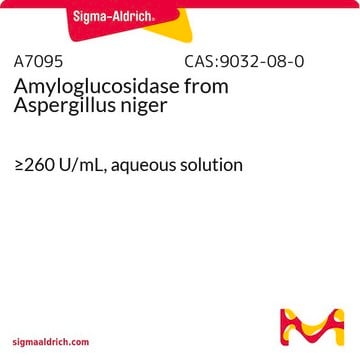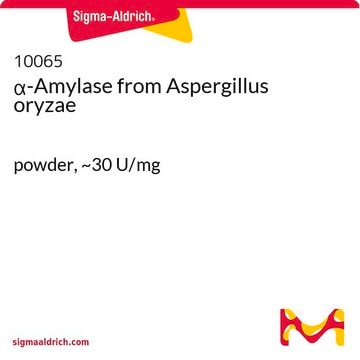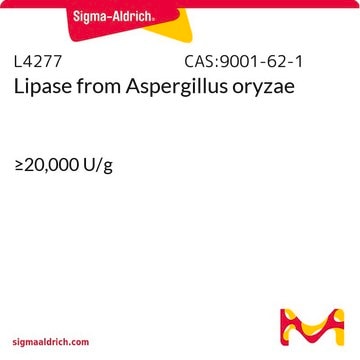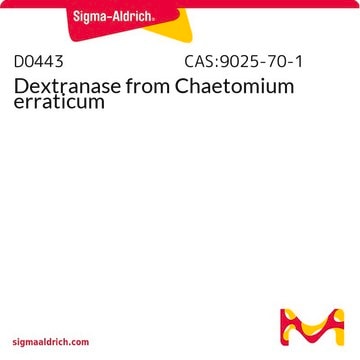A4862
α-Amylase from Bacillus sp.
liquid
Synonym(s):
1,4-α-D-glucan glucanohydrolase, 1,4-alpha-D-glucan glucanohydrolase, Termamyl® 300L, alpha-amylase, endoglucanase
Sign Into View Organizational & Contract Pricing
All Photos(1)
About This Item
CAS Number:
MDL number:
UNSPSC Code:
12352204
NACRES:
NA.54
Recommended Products
General description
α-Amylase belongs to glycosyl hydrolase family 13. It comprises of A, B and C domains. Domain A has two aspartic acid and a glutamic acid as catalytic residues. Domain B possesses Ca2+ and Na+ binding sites.
Application
α-Amylase from Bacillus sp. has been used in the digestion of lyophilized microalgae sample. It has also been used to evaluate α-amylase inhibitory activity in marine algae samples and Myrmecodia platytyrea.
Biochem/physiol Actions
α-Amylase hydrolyzes the polysaccharides starch, malto-oligosaccharides at the α-d-(1,4)-glucosidic linkages to α-anomeric products. It has wide applications in industries including food, pharmaceutical, textile and paper.
Unit Definition
One unit will liberate 1.0 mg of maltose from starch in 3 minutes at pH 6.9 at 20 deg C.
Legal Information
A product of Novozyme Corp.
Termamyl is a registered trademark of Novozymes Corp.
Signal Word
Danger
Hazard Statements
Precautionary Statements
Hazard Classifications
Resp. Sens. 1
Storage Class Code
10 - Combustible liquids
WGK
WGK 3
Flash Point(F)
Not applicable
Flash Point(C)
Not applicable
Choose from one of the most recent versions:
Certificates of Analysis (COA)
Lot/Batch Number
Don't see the Right Version?
If you require a particular version, you can look up a specific certificate by the Lot or Batch number.
Already Own This Product?
Find documentation for the products that you have recently purchased in the Document Library.
Customers Also Viewed
Improving the reversibility of thermal denaturation and catalytic efficiency of Bacillus licheniformis alpha-amylase through stabilizing a long loop in domain B
Li Z, et al.
PLoS ONE, 12(3), e0173187-e0173187 (2017)
Snezana Agatonovic-Kustrin et al.
Marine drugs, 17(3) (2019-03-06)
Marine organisms produce an array of biologically active natural products, many of which have unique structures that have not been found in terrestrial organisms. Hence, marine algae provide a unique source of bioactive compounds. The present study investigated 19 marine
Microalgae Characterization for Consolidated and New Application in Human Food, Animal Feed and Nutraceuticals
Molino A, et al.
International Journal of Environmental Research and Public Health, 15(11), 2436-2436 (2018)
Crystal structure of Bacillus subtilis alpha-amylase in complex with acarbose
Kagawa M, et al.
Journal of Bacteriology, 185(23), 6981-6984 (2003)
High-performance thin-layer chromatography-direct bioautography as a method of choice for alpha-amylase and antioxidant activity evaluation in marine algae
Agatonovic-Kustrin S and Morton DW
Journal of Chromatography A, 1530, 197-203 (2017)
Our team of scientists has experience in all areas of research including Life Science, Material Science, Chemical Synthesis, Chromatography, Analytical and many others.
Contact Technical Service













